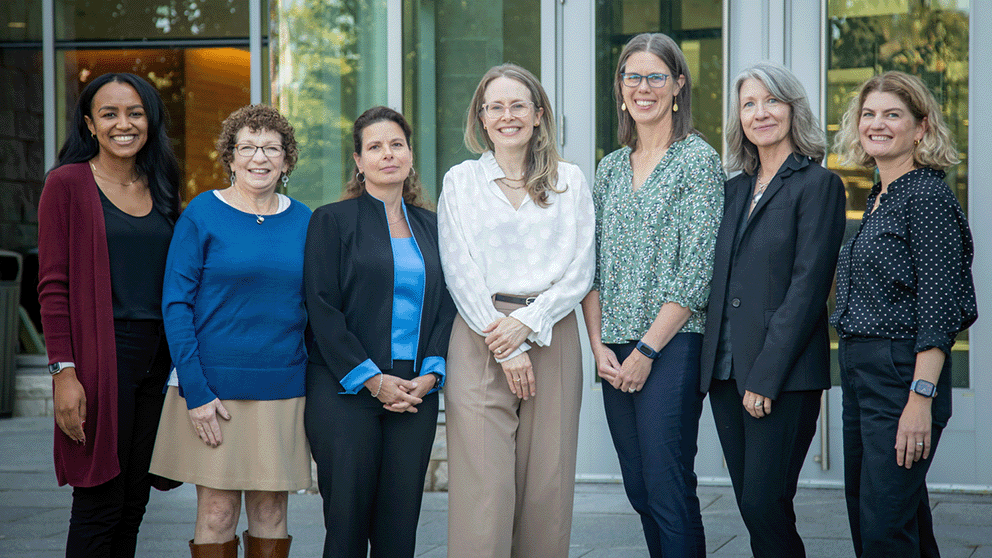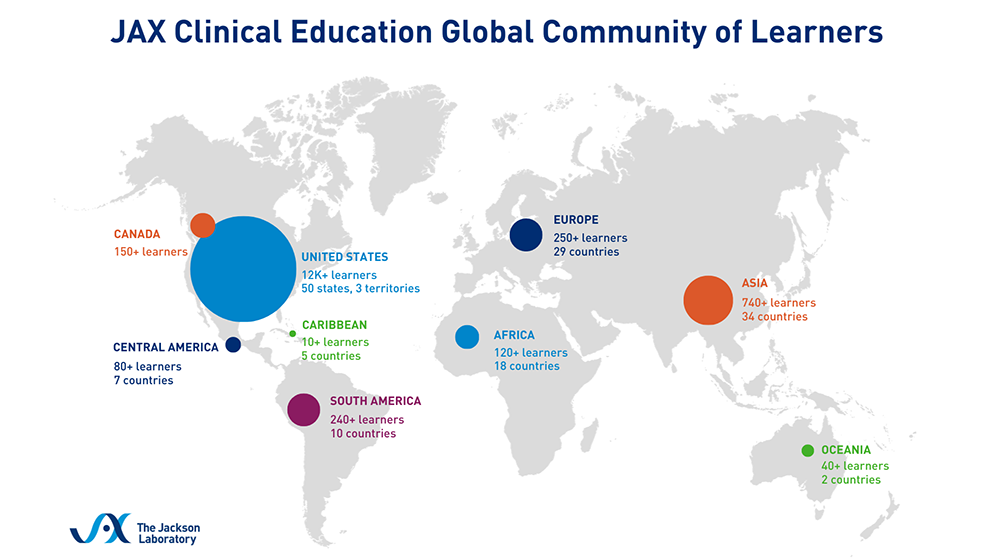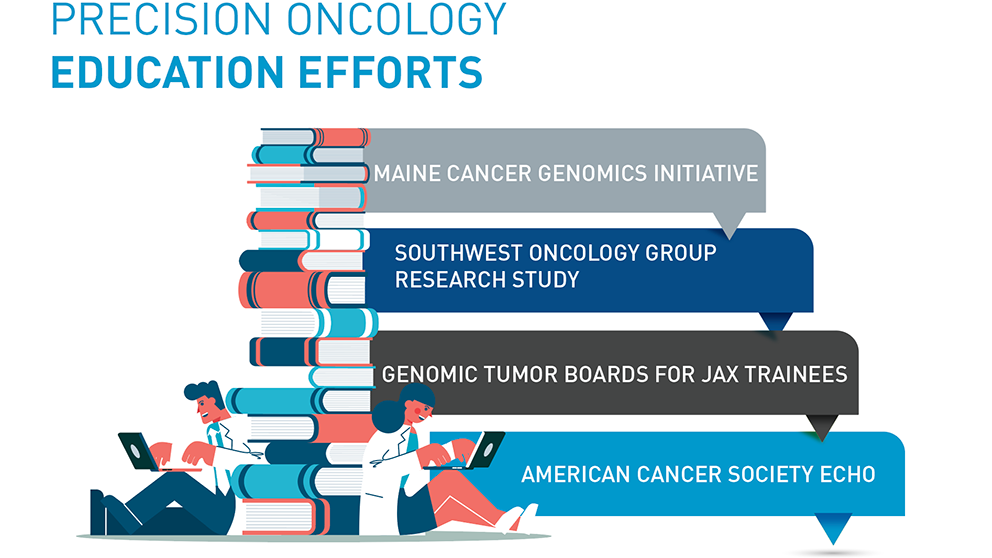
Over a decade ago, The Jackson Laboratory (JAX) embarked on a transformative journey. As a leader in basic mammalian genetics research and exceptional research models, JAX recognized the need to expand into human genomic research and clinical translational studies.
This led to the inception of JAX Genomic Medicine, setting the stage for the Clinical Education Program (CEP) to join the institution soon after.
The program was established with three aims: 1) to elevate the genomic literacy of health care providers, 2) to close the gap between research and clinical practice, and 3) to expand the reach of JAX’s education to a broader audience, creating online education infrastructure and programming.
“As we were building JAX to become more translational, I knew we had to have an arm of JAX to better explain genetic sciences to the public, to trainees, and to the medical community,” shares Professor, President Emeritus and Honorary Fellow Edison Liu, M.D. “I firmly believe that some of the most important health and environmental decisions that we will have to make in the 21st century will be based on applications of genetic principles. Genetic literacy is now critical for wise governance of [the] adoption of critical technologies. Thus, the adoption of the Clinical Education Program [was an] important developmental milestone for our institution.”
Now, a decade later, JAX is uniquely poised to bridge the gap between biological knowledge and medical progress for patient benefit.
National leaders in clinical genetics education
 The JAX Clinical Education team. L to R: Kalisi Logan, Linda Steinmark, Dawn Traficante, Emily Edelman, Kate Reed, Therese Ingram, and Laura West.
The JAX Clinical Education team. L to R: Kalisi Logan, Linda Steinmark, Dawn Traficante, Emily Edelman, Kate Reed, Therese Ingram, and Laura West.
Clinical Education at JAX started when a small but experienced group of genetics educators joined JAX in 2013: Kate Reed, MPH, ScM, CGC; Therese Ingram, M.A., and Emily Edelman, M.S., CGC. Now, Clinical Education has grown to a robust team of six professionals with expertise in integrating best practices in education and implementation science to support the translation of genetics and genomics into practice. The team’s long tenure and reputation in the clinical genetics education community open up opportunities for strategic partnerships, including collaborations with national and regional partners such as the American Cancer Society, the American Medical Association, and Connecticut Department of Public Health. These relationships have fostered an increased awareness of JAX with clinicians worldwide.
“Collaboration with health care providers is essential to achieving our mission of improving the integration of genomics into clinical practice to benefit patients,” says Emily Edelman, director of JAX Clinical Education. “We have been very fortunate to partner with organizations that share in this vision of educating clinicians about genetics and genomics, and see the value of collaborative projects that can leverage JAX’s strengths in education.”
Empowering health care providers in the era of personalized medicine
One of the greatest barriers to clinical translation is a workforce that is unfamiliar with the benefits of genetic and genomic applications. Because clinicians may receive minimal clinical genetics instruction during their training, they can be challenged to use emerging genomic technologies. CEP's programs support clinicians applying genomics in practice and contribute to JAX's mission of advancing human health.
CEP offers a comprehensive online education portfolio that has reached thousands of learners globally since 2014.

The team also works to support JAX’s regional initiatives, including early integration with the Maine Cancer Genomics Initiative (MCGI). By partnering with MCGI leadership, CEP contributed to the research study design, while also addressing patient and provider needs through outreach and education.
"CEP has been an important collaborator in MCGI and, more generally, as we work to increase the capacity of community oncologists to understand and incorporate results from complex biomarker testing into patient care," says Jens Rueter, M.D., medical director of the Maine Cancer Genomics Initiative. "Community oncology providers are challenged to keep up to date with the rapidly evolving evidence linking biomarkers to targeted treatments. The education CEP develops is informed by working directly with these providers and helps address their specific needs."
Integrating clinical, patient and research perspectives
CEP's impact extends beyond health care provider education. By exposing researchers to clinical and patient perspectives and by bringing clinicians closer to genetics and genomics, CEP plays a vital role in facilitating the clinical implementation of genomic research.

As JAX’s translational research program has matured, our biomedical trainees are positioned to revolutionize medicine through their research advancements. Students and early career researchers are often motivated by the patient and human health aspects of genomics. Since 2021, CEP and MCGI have offered JAX trainees an innovative clinical translational training program through the JAX Cancer Center. Participants obtain valuable exposure to patient care discussions and decisions as they attend Genomic Tumor Boards, and also have the opportunity to connect with clinical genomic scientists to learn about different career paths.
Shaping the future of clinical genetic education
The evolution of precision health and personalized medicine in the past decade has transformed patient care. However, the health care workforce is challenged to integrate these advances by a lack of genetic and genomic expertise in clinical training programs. To help meet this need, JAX Clinical Education is creating new programming for clinical trainees. Strategic partnerships with training institutions and new additions to CEP staff will strengthen its capacity to help faculty create a health care workforce prepared to implement genomically informed diagnoses and treatments as they become available.
As the horizon broadens, CEP is poised to support the Laboratory’s strategic goals in rare disease research and other translational efforts.